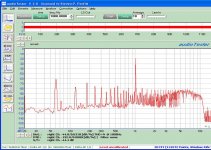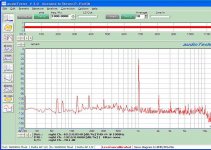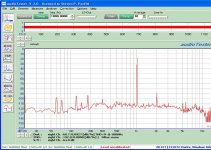I accidentally left my heater resistor termination ungrounded and spent a day chasing noise.
I thought it would be interesting to post the comparison of floating heater and grounded resistor divider noise spectrum.
This graphically demonstrates why one should terminate the heater string with a pair of resistors and ground the center point of the pair.
First image is ungrounded heaters, second image is the same amp with the heater string terminated with two 220 ohm resistors with the center tap tied to ground.
Yes, it sounds as bad as it looks.
I thought it would be interesting to post the comparison of floating heater and grounded resistor divider noise spectrum.
This graphically demonstrates why one should terminate the heater string with a pair of resistors and ground the center point of the pair.
First image is ungrounded heaters, second image is the same amp with the heater string terminated with two 220 ohm resistors with the center tap tied to ground.
Yes, it sounds as bad as it looks.
Attachments
I'm chasing some noise that has recently appeared in my little 6n1p-ev/6p1p-ev SE amp as well. However, the fact that it is built on a 50 year old console chassis with original PSU might have something to do with it 
Interestingly, up until I noticed some PSU noise, the sound quality from the amp has been steadily improving all on its own. I have measured the supplies and bias and nothing has changed there, so the only thing I can put it down to is that the tubes have finally broken in (probably have 150 hours on them now from new).
I'll be REAL annoyed if I change the filter capacitors and it degrades the sound!
Gary
Interestingly, up until I noticed some PSU noise, the sound quality from the amp has been steadily improving all on its own. I have measured the supplies and bias and nothing has changed there, so the only thing I can put it down to is that the tubes have finally broken in (probably have 150 hours on them now from new).
I'll be REAL annoyed if I change the filter capacitors and it degrades the sound!
Gary
I'm chasing some noise that has recently appeared in my little 6n1p-ev/6p1p-ev SE amp as well. However, the fact that it is built on a 50 year old console chassis with original PSU might have something to do with it
Interestingly, up until I noticed some PSU noise, the sound quality from the amp has been steadily improving all on its own. I have measured the supplies and bias and nothing has changed there, so the only thing I can put it down to is that the tubes have finally broken in (probably have 150 hours on them now from new).
I'll be REAL annoyed if I change the filter capacitors and it degrades the sound!
Gary
Measure first then replace if necessary.. You'll probably find the ripple on the supply has increased significantly, or the driver tube if common to both channels may have developed some filament to cathode leakage.. Leakage can usually be reduced by elevating the filament supply some 15 - 50V above the voltage on the cathode(s).
Modern high voltage electrolytics generally perform a bit better than the antiques they replaced. Sometimes a little help from a judiciously chosen film cap across the EL terminals can make a significant difference, in other cases no change will be heard. (In still others it may create problems with unintended resonances between the EL cap ESL and the film bypass cap - a small resistor in series with the film cap generally fixes that..)
I accidentally left my heater resistor termination ungrounded and spent a day chasing noise.
I thought it would be interesting to post the comparison of floating heater and grounded resistor divider noise spectrum.
This graphically demonstrates why one should terminate the heater string with a pair of resistors and ground the center point of the pair.
First image is ungrounded heaters, second image is the same amp with the heater string terminated with two 220 ohm resistors with the center tap tied to ground.
Yes, it sounds as bad as it looks.
Yeah, been there, done that.. The pix really illustrate the point well. In some cases elevating the filament supplies even in a pa will result in some small, but significant improvement - would be interesting to see if that is the case here, although the results with the resistive divider grounded are quite good.
Any idea where that 70Hz tone is coming from, I'm assuming it is a radiated artifact from somewhere else? (Analog computer monitor??)
Last edited:
I tried elevating the resistor divider and it was actually worse than when grounded. Since the difference in s/n is greater than 3dB I consider it to be significant.
Yup, analog computer monitor.
Wow that is pretty surprising, usually I have either had a small to significant improvement or no significant change - often i need to do this because of the voltage on the cathode.. I do usually set the LF corner on that RC network at less than a couple of Hz.. Honestly I am one of those crazies who heats with DC and elevates them in most cases - has the usual happy result that LF residuals are below the noise floor of my FFT measurement set up, which with some care is usually around -120dBfs... (Yeah everything is pretty well shielded and the computer has been tweaked somewhat - lead dress, etc.)
I remember the first FFT (LAUD) based set up I had, it had actual hardware DSP w/16 bit 48kHz sample rate converters. (A very expensive Turtle Beach sound card basically) I was constantly fighting radiation from the monitor at both 75Hz, and ~30kHz.. It hardly ever worked right and cost over $2K with hardware, software and PC.. The current set up M Audio 24192, Peter Millets interface, Audiotester V3 software, computer and monitor cost less than $600 for everything and blows that set up out of the water.. It actually works when I go to use it, what a concept....
I did not bypass the lower resistor, and wonder if that would have made a difference. Elevation was 62V with a simple resistor divider.
I suspect cathode composition may effect how well a tube responds to elevated heater bias voltage. The 6N1P may just be a bad choice for elevating the heater.
I suspect cathode composition may effect how well a tube responds to elevated heater bias voltage. The 6N1P may just be a bad choice for elevating the heater.
Hello,
Happy 4th to all. Thinking of noise on the heaters, not good stuff. This is just me thinking of an explanation for the observed response. TheGimp you do not say if you have AC or DC on the heaters. If it was pure DC there would be no noise. Tying the center of the resistor pair to ground provides a relatively low resistance path to ground and the noise goes away. If the heater loop is DC and elevated to some point above ground the relatively low resistance path to ground is lost and the noise is free to be a gremlin in your amplifier and mess up that pretty base line on your FFT. Here is a proposed solution to the noise on the elevated heater loop. At The point where the resistor pair ties to the elevated DC voltage install a capacitor between that point and ground. The capacitor will ground the AC noise while the DC is not.
DT
All Just for fun!
Happy 4th to all. Thinking of noise on the heaters, not good stuff. This is just me thinking of an explanation for the observed response. TheGimp you do not say if you have AC or DC on the heaters. If it was pure DC there would be no noise. Tying the center of the resistor pair to ground provides a relatively low resistance path to ground and the noise goes away. If the heater loop is DC and elevated to some point above ground the relatively low resistance path to ground is lost and the noise is free to be a gremlin in your amplifier and mess up that pretty base line on your FFT. Here is a proposed solution to the noise on the elevated heater loop. At The point where the resistor pair ties to the elevated DC voltage install a capacitor between that point and ground. The capacitor will ground the AC noise while the DC is not.
DT
All Just for fun!
That is why always for every tube amplifier I have build I use only DC for heaters no matter what.I accidentally left my heater resistor termination ungrounded and spent a day chasing noise.
I thought it would be interesting to post the comparison of floating heater and grounded resistor divider noise spectrum.
This graphically demonstrates why one should terminate the heater string with a pair of resistors and ground the center point of the pair.
First image is ungrounded heaters, second image is the same amp with the heater string terminated with two 220 ohm resistors with the center tap tied to ground.
Yes, it sounds as bad as it looks.
Call me DC heaters junkie !
I did not bypass the lower resistor, and wonder if that would have made a difference. Elevation was 62V with a simple resistor divider.
I suspect cathode composition may effect how well a tube responds to elevated heater bias voltage. The 6N1P may just be a bad choice for elevating the heater.
Definitely need that bypass cap, that's why it was worse, that it wasn't much worse is something of a surprise actually. Since you've done the rest it would be interesting to see what happens with it properly bypassed. (It should be the same or even slightly better, but in any event the results are of interest..)
- Status
- This old topic is closed. If you want to reopen this topic, contact a moderator using the "Report Post" button.
- Home
- Amplifiers
- Tubes / Valves
- comparison of heater termination noise


